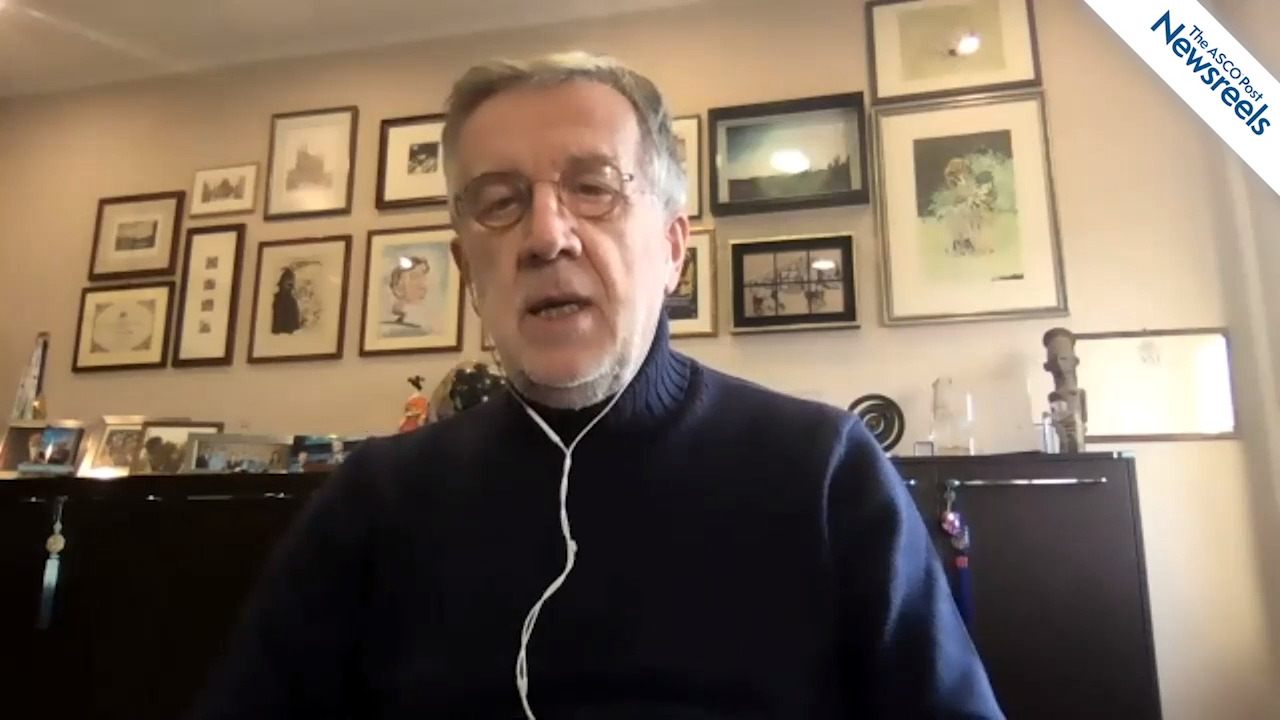Silvia Novello, MD, PhD, on NSCLC: Pharmacogenomics-Driven vs Standard Adjuvant Chemotherapy
Silvia Novello, MD, PhD, of the University of Turin, discusses phase III results from the ITACA trial, which explored the notion of improving survival by customizing treatment and reducing toxicities for patients with completely resected stage II to IIIA non–small cell lung cancer (Abstract PS01.04).
Taiwanese TALENT Study Supports Effectiveness of Low-Dose CT for Lung Cancer in Certain Populations
A study presented by researchers with the Ministry of Health and Welfare in Taiwan confirmed low-dose computed tomography (CT) screening may be feasible in a predefined, never-smoking, high-risk population. The research was presented at the International Association for the Study of Lung Cancer...
Two ADAURA Analyses Support the Use of Osimertinib in Patients With Surgically Resected NSCLC
Two presentations based on data from the ADAURA clinical trial advanced previous research that demonstrated improved disease-fee survival outcomes for patients with surgically resected non–small cell lung cancer (NSCLC) receiving osimertinib, while also maintaining quality of life. The data were...
FDA Grants Accelerated Approval to Tepotinib for Patients With Metastatic NSCLC and MET Exon 14–Skipping Alterations
On February 3, the U.S. Food and Drug Administration (FDA) granted accelerated approval to tepotinib (Tepmetko) for adult patients with metastatic non–small cell lung cancer (NSCLC) harboring mesenchymal-epithelial transition (MET) exon 14–skipping alterations. VISION Trial Efficacy was...
Dean Fennell, FRCP, PhD, on Mesothelioma: Nivolumab vs Placebo in Relapsed Disease
Dean Fennell, FRCP, PhD, of the University of Leicester, discusses phase III results from the CONFIRM trial, which sought a standard immunotherapy treatment to improve overall survival for patients with mesothelioma who have relapsed after taking pemetrexed and cisplatin. Globally, the incidence of mesothelioma is on the rise; in the United Kingdom alone, it has gone up nearly 500% since the 1970s (Abstract PS01.11).
WCLC Press Briefing Focuses on the Connection Between Lung Cancer and COVID-19
On February 27, 2020, the Journal of Thoracic Oncology published a case study that described two patients from Wuhan, China, who had recently underwent lung lobectomies for adenocarcinoma and were retrospectively found to have had COVID-19 at the time of surgery. Eleven months later, the lung...
Nivolumab Monotherapy Improves Survival in Patients With Relapsed Malignant Mesothelioma
In patients with relapsed malignant mesothelioma, treatment with single-agent nivolumab led to a significant improvement in both overall and progression-free survival in the phase III CONFIRM trial. These findings were presented by Dean A. Fennell, FRCP, PhD, Professor and Chair of Thoracic Medical ...
LCMC3 Trial: Neoadjuvant Atezolizumab for Patients With Stage IB to IIIB Resectable Lung Cancer
Neoadjuvant treatment with single-agent atezolizumab for patients with stage IB to IIIB lung cancer resulted in a major pathologic response rate of 21% and pathologic complete response rate of 7% in the primary analysis of the Lung Cancer Mutation Consortium 3 (LCMC3) study. The findings were...
Giorgio V. Scagliotti, MD, PhD, on Doubling the Lung Cancer Cure Rate by 2025: A Realistic Goal
Giorgio V. Scagliotti, MD, PhD, of the University of Torino, talks about why he believes that many more patients with lung cancer can be cured within the next 4 years, given decreases in mortality rates, widespread use of targeted treatments and immunotherapies, and earlier diagnoses as a result of systematic screening with low-dose CT (Abstract PL05.08).
Featured Presentations at WCLC Focus on Disparities in Patients With Lung Cancer
At a press briefing held by the International Association for the Study of Lung Cancer (IASLC), researchers presented new data that revealed factors relating to race, gender, sexual orientation, and income continue to be significant barriers to those living with lung cancer. The press briefing is...
Negative Findings in KEYNOTE-598: Ipilimumab Adds No Benefit to Pembrolizumab as First-Line Therapy for NSCLC With High PD-L1 Expression
In the phase III KEYNOTE-598 study, the addition of ipilimumab to pembrolizumab increased toxicity without boosting efficacy as first-line therapy for metastatic non–small cell lung cancer (NSCLC) in patients with high expression of PD-L1, according to research presented at International...
Phase II CodeBreak 100 Validates Early Benefit for KRAS Inhibitor in NSCLC
The phase II CodeBreak 100 trial has validated the power of KRAS inhibition with sotorasib (AMG 510) in patients with advanced non–small cell lung cancer (NSCLC). In a follow-up to phase I data, the phase II cohort of the study has now shown a durable response rate of 37.1%, a disease control rate...
‘State of Tobacco Control’ 2021 Report Says Ending Tobacco Use Is Critical, Especially During the COVID-19 Pandemic
Even amid the COVID-19 pandemic, tobacco use remains a serious public health threat. In addition to tobacco-related death and disease, smoking also increases the risk of the most severe impacts of COVID-19. The American Lung Association has released its 19th annual “State of Tobacco Control”...
CheckMate 9LA Trial: First-Line Nivolumab/Ipilimumab Plus Chemotherapy vs Chemotherapy Alone in Stage IV or Recurrent NSCLC
As reported in The Lancet Oncology by Luis Paz-Ares, MD, and colleagues, the phase III CheckMate 9LA trial has shown improved overall survival with first-line nivolumab/ipilimumab plus two cycles of chemotherapy vs four cycles of chemotherapy alone in patients with stage IV or recurrent non–small...
Single-Institution Study Examines Safety of Routine Thoracic Surgery, Examinations During the COVID-19 Pandemic
A study published by Wang et al in JTO Clinical and Research Reports compared surgeries performed at one Chinese hospital in 2019 with a similar date range during the COVID-19 pandemic. Researchers found that routine thoracic surgery and invasive examinations were performed safely during the...
Study Identifies Four Unique Subtypes of Small Cell Lung Cancer
Researchers have developed the first comprehensive framework to classify small cell lung cancer (SCLC) into four unique subtypes based on gene expression and have identified potential therapeutic targets for each type. These findings were published by Gay et al in Cancer Cell. SCLC is known for...
Osimertinib in Adjuvant Therapy for NSCLC With EGFR Mutations
On December 18, 2020, osimertinib was approved for adjuvant therapy after tumor resection in patients with non–small cell lung cancer (NSCLC) with tumors with EGFR exon 19 deletions or exon 21 L858R mutations, as detected by a U.S. Food and Drug Administration (FDA)-approved test.1,2 Supporting...
IMpower133 Update: Atezolizumab Plus Carboplatin/Etoposide for Extensive-Stage Small Cell Lung Cancer
As reported in the Journal of Clinical Oncology by Stephen V. Liu, MD, and colleagues, an updated overall survival analysis in the phase I/III IMpower133 trial showed continued benefit with the addition of atezolizumab to carboplatin/etoposide as first-line treatment in patients with...
Prevalence of KRAS G12C Somatic Mutations by Cancer Type, Race, and Sex
In a study reported in a letter to the editor in The New England Journal of Medicine, Nassar et al identified the prevalence of the formerly “undruggable” KRAS G12C mutation across tumor types, race, and sex. As stated by the investigators, a recently reported early-phase clinical trial has shown...
Record Drop in Cancer Mortality for Second Straight Year Due to Improved Lung Cancer Treatment Reported in ‘Cancer Statistics, 2021’
Overall cancer death rates in the United States dropped continuously from 1991 through 2018, for a total decrease of 31%, including a 2.4% decline from 2017 to 2018. These findings were reported in the American Cancer Society’s “Cancer Statistics, 2021” article, published by Rebecca L. Siegel, MPH, ...
Transmission of Maternal Cancer in Two Infants From Mothers With Cervical Cancer During Delivery
In a brief report published in The New England Journal of Medicine, Arakawa et al described the identification of lung cancer in two children that likely resulted from transmission of maternal cervical cancer tumor cells during vaginal delivery. As noted by the investigators, the transmission of...
Analysis of Cardiac Data Among Patients Treated With Osimertinib
As reported in the Journal of Clinical Oncology by Michael S. Ewer, MD, JD, PhD, and colleagues, an analysis of data from clinical trials of osimertinib suggests the absence of a “causal relationship” between osimertinib and cardiac failure. Study Details The study involved a post hoc assessment of ...
FDA Pipeline: Two Reviews in NSCLC, Plus Prescribing Information Update for Darolutamide
Recently, the U.S. Food and Drug Administration (FDA) granted Priority Review to lorlatinib in ALK-positive non–small cell lung cancer (NSCLC) and Breakthrough Therapy designation to the combination of tiragolumab plus atezolizumab in NSCLC with high PD-L1 expression. The FDA also updated the...
Invasive Diagnostic Procedure Complication Rates After Lung Cancer Screening
In a study reported in a research letter in JAMA Network Open, Zhao et al found that the rate of complications from invasive diagnostic procedures after low-dose computed tomography (CT) lung cancer screening in the community setting was lower than a prior estimate—but still higher than reported in ...
Does Anticancer Therapy Impact Unplanned Hospital Care in Patients With NSCLC?
In a single-institution study reported in JCO Oncology Practice, Shah and Neal found that only a small proportion of unplanned hospital encounters were related to anticancer therapy among patients with non–small cell lung cancer (NSCLC), with almost one-quarter of such encounters being considered...
Adjuvant Gefitinib vs Vinorelbine/Cisplatin in Stage II–IIIA EGFR-Mutant NSCLC: Final Overall Survival Analysis
As reported in the Journal of Clinical Oncology by Zhong et al, the final overall survival results of the phase III CTONG1104 trial indicated no significant advantage of adjuvant gefitinib vs vinorelbine/cisplatin in patients with EGFR-mutant stage II–IIIA (N1–2) non–small cell lung cancer ...
Nivolumab Indication in Small Cell Lung Cancer Withdrawn in U.S. Market
On December 29, Bristol Myers Squibb issued the following statement on nivolumab’s small cell lung cancer (SCLC) indication in the United States. In 2018, nivolumab was granted accelerated approval by the U.S. Food and Drug Administration (FDA) for the treatment of patients with SCLC whose disease...
Left Anterior Descending Coronary Artery Radiation Exposure, Cardiac Events, and Mortality in NSCLC
In a retrospective cohort analysis reported in JAMA Oncology, Atkins et al identified a volume (V, percent) of exposure of the left anterior descending (LAD) coronary artery to a radiation dose (V15 Gy ≥10%) that is an independent risk factor for major adverse cardiac events and all-cause mortality ...
Effect of the COVID-19 Pandemic on Lung Cancer Screening
Reporting on how deferred care worsened outcomes for patients with lung cancer when the COVID-19 pandemic first surged in the spring of 2020, Robert M. Van Haren, MD, MSPH, FACS, and colleagues explained that they have identified a framework that could help people with serious health conditions...
FDA Approves Adjuvant Osimertinib for EGFR-Mutated NSCLC
On December 18, the U.S. Food and Drug Administration (FDA) approved osimertinib (Tagrisso) for adjuvant therapy after tumor resection in patients with non–small cell lung cancer (NSCLC) whose tumors have epidermal growth factor receptor (EGFR) exon 19 deletions or exon 21 L858R mutations, as...
Association of Out-of-Pocket Costs for Tyrosine Kinase Inhibitors With Outcomes in Patients With EGFR- and ALK-Positive Advanced NSCLC
In a single-institution study reported in JCO Oncology Practice, Bernardo H.L. Goulart, MD, and colleagues found that higher out-of-pocket costs for tyrosine kinase inhibitors (TKIs) were associated with reduced adherence to and increased discontinuation of TKI therapy—as well as poorer overall...
ESMO Immuno-Oncology 2020: Sintilimab vs Docetaxel for Advanced Squamous NSCLC
Sintilimab provided superior clinical benefit compared to docetaxel in patients with previously treated, advanced and/or metastatic squamous non–small cell lung cancer (NSCLC), according to phase III study findings presented by Shi et al at the European Society for Medical Oncology (ESMO)...
Updated Results of CASPIAN Trial: Addition of Durvalumab With or Without Tremelimumab to Chemotherapy in Extensive-Stage SCLC
As reported in The Lancet Oncology by Goldman et al, updated results from the phase III CASPIAN trial showed maintained improvement in overall survival with first-line durvalumab plus platinum/etoposide vs platinum/etoposide in patients with extensive-stage small cell lung cancer (SCLC). However,...
ESMO Immuno-Oncology 2020: Does Pleural Effusion Affect Survival in Patients Treated With Immunotherapy for NSCLC?
Patients with non–small cell lung cancer (NSCLC) who have pleural effusion, especially those requiring pleural evacuation, experienced poorer survival when treated with immune checkpoint inhibitors, according to findings presented by Epaillard et al at the European Society for Medical Oncology...
The Lung Microbiome May Affect Lung Cancer Pathogenesis and Prognosis
Enrichment of the lungs with oral commensal microbes was associated with advanced-stage disease, worse prognosis, and tumor progression in patients with lung cancer, according to results from a study published in Cancer Discovery, a journal of the American Association for Cancer Research.1 “The...
Expert Point of View: Joel W. Neal, MD, PhD
Invited discussant of the abstract, Joel W. Neal, MD, PhD, Associate Professor of Medicine at Stanford University, called this real-world analysis novel,1 given the decreasing number of patients treated with single-agent immunotherapy. “I think we’re unlikely to have a larger prospective study [in...
Lung Cancer Progression-Free Survival With Immunotherapy Varies Significantly by Tumor-Mutation Subtype, Real-World Data Show
A real-world study of single-agent immune checkpoint inhibitors in driver-mutated non–small cell lung cancer (NSCLC) has demonstrated significant variation in progression-free survival between mutation subtypes, according to data presented during the International Association for the Study of Lung...
Early-Stage Lung Cancer: An Overview of the Clinical Trial Landscape
Although early-stage, resectable disease represents the best chance for meaningful long-term survival and cure for patients with lung cancer, there are still high rates of recurrence. According to Rajwanth Veluswamy, MD, MSCR, neoadjuvant and adjuvant treatments are needed to improve surgical...
Expert Point of View: Thomas J. Dilling, MD, MS
Formal discussant Thomas J. Dilling, MD, MS, of Moffitt Cancer Center, Tampa, Florida, congratulated the authors on this study. He noted that early findings from both treatment arms showed similar rates of grade 3 and higher toxicity. “However, in the [four-fraction] arm, a fatal event occurred in...
Single-Fraction SBRT May Be Equivalent to Four in Patients With Oligometastatic Lung Disease
Delivering stereotactic body radiation therapy (SBRT also called stereotactic ablative radiotherapy) in one or four treatment sessions led to similar outcomes in patients with up to three lung metastases (ie, oligometastatic disease) in the phase II randomized SAFRON II trial. The study, conducted...
Expert Point of View: Matthijs Oudkerk, MD
Matthijs Oudkerk, MD, Professor of Radiology at the University Medical Center Groningen, Netherlands, and Principal Investigator for Radiology of the NELSON Lung Cancer Detection Study, stressed that detecting individuals who have early-stage lung cancer with more virulent biologic behavior is...
Surgical Resection of Stage I Lung Cancer: Rating the Evidence of Benefit
A recent report from the U.S. Preventive Services Task Force (USPSTF) has undermined the evidentiary basis for the primary treatment of stage I non–small cell lung cancer (NSCLC) while rating the evidence for the benefit of screening as “high.”1 According to David F. Yankelevitz, MD, these...
Proportion of Never-Smokers Among Patients With Lung Cancer in Seven U.S. States
In a study reported in a research letter in JAMA Oncology, Siegel et al found that never-smokers accounted for 12.5% of patients diagnosed with lung cancer in seven U.S. states during a recent 6-year period, with women accounting for a higher proportion than men. Study Details The study included...
Native American Ancestry May Impact Somatic Alterations Among Latin American Patients With Lung Cancer
A research brief by Carrot-Zhang et al published in Cancer Discovery investigating inherited lung cancer risk—especially in nonsmokers—in Latin America has found that independent of smoking status, variation in EGFR and KRAS mutation frequency in Latin American patients with lung cancer was...
FDA Pipeline: Agents in DLBCL, SCLC, AML, and More
Recently, the U.S. Food and Drug Administration (FDA) has issued regulatory decisions for agents to treat diffuse large B-cell lymphoma (DLBCL), small cell lung cancer (SCLC), acute myeloid leukemia (AML), biliary tract cancer, and graft-vs-host disease. Priority Review for Loncastuximab Tesirine...
First-Line Atezolizumab Improves Overall Survival vs Chemotherapy in Certain Patients With Metastatic NSCLC
As reported in The New England Journal of Medicine by Roy S. Herbst, MD, PhD, of Yale School of Medicine, and colleagues, the phase III IMpower110 trial has shown significantly prolonged overall survival with first-line atezolizumab vs platinum-based chemotherapy in metastatic non–small cell lung...
Racial Disparities in Treatment of Common Lung Cancer Persist Despite Gains
Lung cancer continues to be the most deadly solid cancer in the world, despite the fact that survival rates have been improving over the past decade. However, Black patients have worse outcomes and shorter lifespans after being diagnosed with lung cancer. A study published in the Journal of...
KRAS Inhibitor Adagrasib Shows Activity in Non–Small Cell Lung Cancer
Another novel oral KRAS inhibitor—adagrasib (MRTX849)—has shown promise in early clinical trials, according to investigators of the KRYSTAL-1 study who reported findings at the virtual 32nd EORTC-NCI-AACR Symposium on Molecular Targets and Cancer Therapeutics.1,2 The conference is jointly provided...
Phase III GEMSTONE-302 Trial Finds CS1001 Plus Platinum Chemotherapy Prolongs Progression-Free Survival in NSCLC
The addition of CS1001, an anti–PD-L1 monoclonal antibody, to platinum-based chemotherapy significantly prolonged progression-free survival vs chemotherapy in treatment-naive patients with advanced non–small cell lung cancer (NSCLC), according to phase III findings presented by Zhou et al at the...
Nivolumab Plus Ipilimumab in First-Line NSCLC: Two New Indications, Many More Questions
In May 2020, the combination of nivolumab and ipilimumab was approved by the U.S. Food and Drug Administration (FDA) for two separate indications in the first-line setting of advanced non–small cell lung cancer (NSCLC). One was in metastatic NSCLC with tumors that have PD-L1 expression ≥ 1% with...



